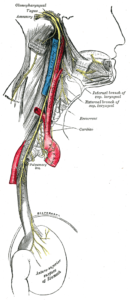Water ~ Tone your vagal nerve
Stimulation of the vagus nerve plays an important role in the management of anxiety and mental health issues. The vagus nerve is the longest running cranial nerve in your body. It is one of ten paired cranial nerves and runs from the stem of your brain all the way down to your gut. The word “vagus” translates to “wandering” in Latin, and the vagus nerve certainly does that.
As the longest and most complex of all the cranial nerves, it starts at the stem of the brain, behind the ears before it meanders down the sides of the neck, through the chest, and eventually ends in the abdomen linking the brain to the heart, lungs, throat, and gut. It helps to regulate our heart rate, blood pressure, digestion, sweating, and speech.
When we are in parasympathetic dominance we are able to rest and heal.
The vagus nerve and it’s feedback are the sensory network that informs the brain of what’s going on in our organs, most specially the digestive tract (stomach and intestines), lungs and heart, spleen, liver, and kidneys.
People with good vagal tone can relax faster after a stress and are more capable of regulating blood glucose levels, reducing chances of diabetes, stroke and cardiovascular disease. Recent research presented by the European League Against Rheumatism indicate that vagus nerve stimulation significantly reduces symptoms of rheumatoid arthritis.
Symptoms are messages from our body that something is wrong. Poor vagal tone can express as ongoing high levels of stress, anxiety, depression, overwhelm, an inability to focus or regulate emotions and inflammation. The nerve can become damaged express deeper dysfunction such as abnormal heart rate, blood pressure or glucose. Digestion or speech may be become compromised.
It is essential to listen to our bodies. Winter is the perfect season to slow down and take notice of our capacity to reset, restore and recharge.
Significant and important research has been making the news about a microbiota-gut-brain axis. Read up on this fascinating subject here. Also this article discusses the science behind gut microbiota, brain function and stress related disorders.

